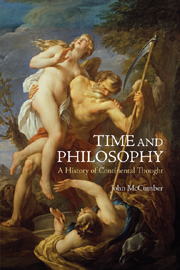Book contents
- Frontmatter
- Contents
- Acknowledgements
- Abbreviations and note on texts
- Introduction
- I Germany, 1790–1890
- II Germany and America, 1900–1968
- 6 The return of traditional philosophy: Edmund Husserl
- 7 The finite future: Martin Heidegger
- 8 Activity and mortality: Hannah Arendt
- 9 The twilight of Enlightenment: Theodor W. Adorno and Max Horkheimer
- III France, 1945–2004
- IV Onwards, 2011–
- Further reading
- Bibliography
- Index
7 - The finite future: Martin Heidegger
from II - Germany and America, 1900–1968
- Frontmatter
- Contents
- Acknowledgements
- Abbreviations and note on texts
- Introduction
- I Germany, 1790–1890
- II Germany and America, 1900–1968
- 6 The return of traditional philosophy: Edmund Husserl
- 7 The finite future: Martin Heidegger
- 8 Activity and mortality: Hannah Arendt
- 9 The twilight of Enlightenment: Theodor W. Adorno and Max Horkheimer
- III France, 1945–2004
- IV Onwards, 2011–
- Further reading
- Bibliography
- Index
Summary
In September 1933, five months after Husserl was banned from the University of Freiburg, a casual visitor there might have found things quite normal. Preparations were underway for the start of Winter Semester. Classrooms and offices were getting their final cleaning and repairs; early-bird students were unpacking and greeting one another; and not a few professors were doing last minute revisions to their lecture notes.
Chemistry professor Hermann Staudinger, however, was having trouble concentrating. He was not alone. Beneath the veneer of normalcy they were trying desperately to maintain, many Germans were terribly worried about what the Nazi government, now firmly in the hands of Hitler, was going to do to their country. A smaller but still large number, including all but the most obtuse of Germany's Jews, was worried about what the government was going to do to them personally. Staudinger, although not Jewish, was in the latter group. He had been a draft dodger in the First World War, and had even published pacifist articles warning that technological advances had fundamentally changed the nature of war. This would hardly endear him to the war-loving Nazis, if it were to become known, and Staudinger was attempting to wait out the Nazi rule in Freiburg, as far as he could get from Berlin. In the interests of survival, he also was not drawing attention to himself by publishing or even doing research.
- Type
- Chapter
- Information
- Time and PhilosophyA History of Continental Thought, pp. 159 - 200Publisher: Acumen PublishingPrint publication year: 2011

